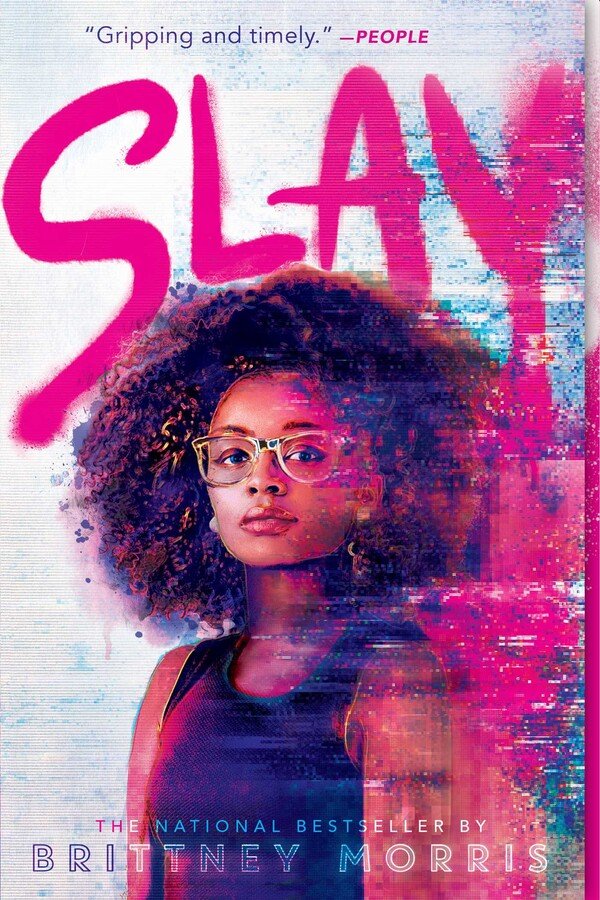SLAY by Brittney Morris: Book review
SLAY by Brittney Morris synopsis
'We are different ages, genders and traditions ... but tonight we all SLAY'
Black Panther meets Ready Player One. A fierce teen game developer battles a real-life troll intent on ruining the Black Panther-inspired video game she created and the safe community it represents for black gamers.
By day, seventeen-year-old Kiera Johnson is a college student, and one of the only black kids at Jefferson Academy. By night, she joins hundreds of thousands of black gamers who duel worldwide in the secret online role-playing card game, SLAY.
No one knows Kiera is the game developer - not even her boyfriend, Malcolm. But when a teen in Kansas City is murdered over a dispute in the SLAY world, the media labels it an exclusionist, racist hub for thugs.
With threats coming from both inside and outside the game, Kiera must fight to save the safe space she's created. But can she protect SLAY without losing herself?
My review:
“As we duel, as we chat, there’s an understanding that ‘your Black is not my Black’ and ‘your weird is not my weird’ and ‘your beautiful is not my beautiful,’ and that’s okay.” - Kiera Johnson, SLAY

Slay
by Brittney Morris
My rating:
5 of 5 stars
I wish I could read this book for the first time again and again and again.
Brittney keeps the plot moving along quickly, and we're taken on such a fun, adventurous journey, yet she still covers many important topics, from white privilege to police brutality.
When we look at Peggy McIntosh’s paper published in Peace and Freedom (1989) on White Privilege, she lists around 26 examples of white privilege that she gets afforded to her. Number 15 is, “I am never asked to speak for all the people of my racial group.”
In this book, we see a glaring example right in the opening chapter when Kiera’s best friend, Harper, asks Kiera: “Am I allowed to get dreadlocks?”
Kiera narrates, “How am I supposed to tell her yes without giving the disclaimer that I can’t speak for all Black people and that she could ask any of us this question and get a different answer every time?”
I’m not Black myself, but I am what people call a “BIPOC” in the US. I really related to some of Kiera’s thoughts, especially when she says, “ I’m sick and tired of being the only Black girl among all white people. ” Oh, Kiera. My inner 7-year-old really feels this, growing up as the only Brown girl in a mostly white school and neighbourhood.
Moreover, we get a lot of insight into, I suspect, some of Brittney’s own experiences growing up in America, as she mentions in her acknowledgements: “In creating Kiera, I was forced to reconcile my experiences as a Black girl, now a woman, with what the world tells me Blackness is. Everyone has an opinion about how we as Black people should act and which of our accomplishments deserve respect.”
It’s uplifting to read her concluding thoughts on this: “SLAY taught me that the magic of Blackness is what we make it, that we define our future, and that we as a people deserve all the greatness our ancestors imagined for us.”
Finally, I truly enjoyed so many of the friendships between the characters and can safely say the Bechdel test was passed with flying colours. Kiera has a rich support network of beautiful friendships. I appreciate the different perspectives coming from Steph, “royalty of the most feminist high school sorority in the country”, Harper, Kiera’s white best friend and “Cicada,” Kiera’s business partner.
People have compared this book to Ready Player One, The Hate U Give, as well as Black Panther. I understand the comparisons but also believe the book is its own unique entity. I definitely was educated and entertained thoroughly while reading this book and highly recommend it to everyone.
4.75 stars, rounded up to 5… oh whatever, let’s just call it 5 stars.
